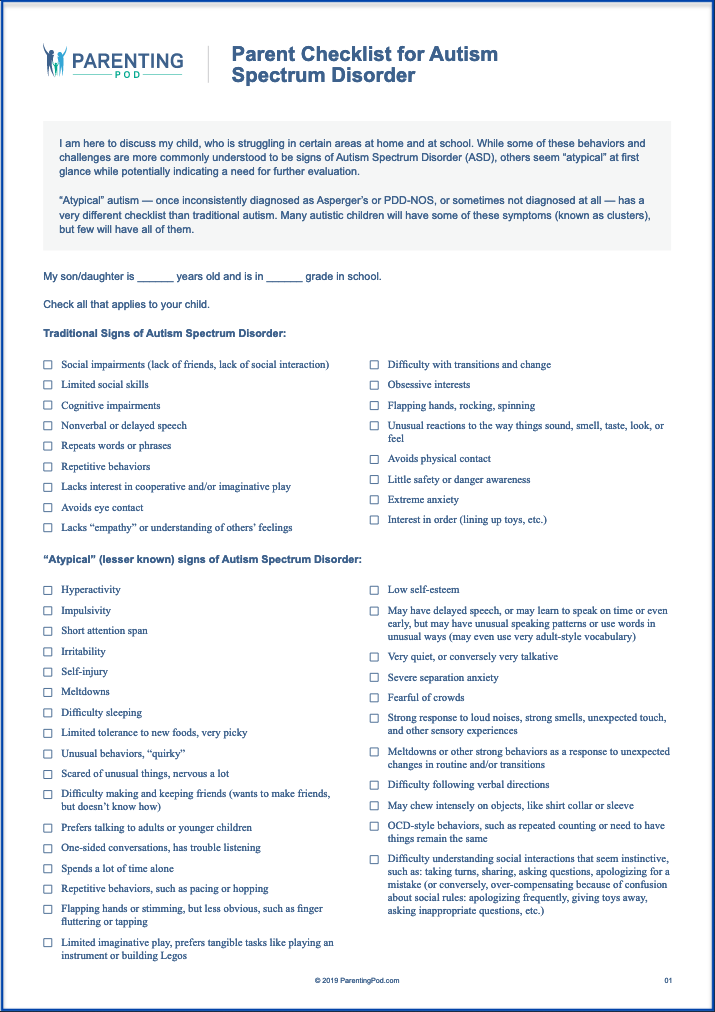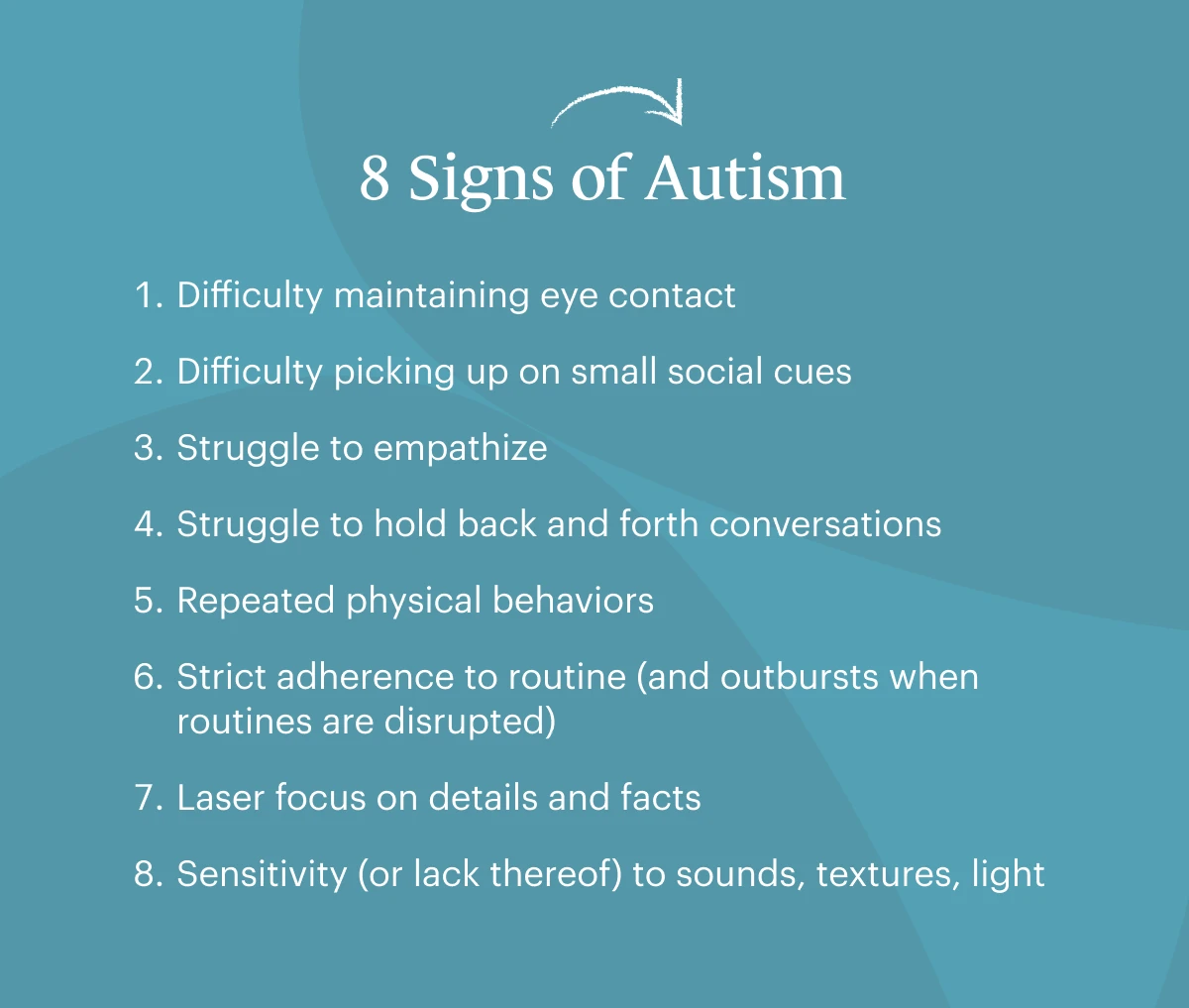Secret Indications and Signs to Acknowledge in Individuals With Behavioral Autism
When you come across somebody with behavioral autism, acknowledging essential indications and signs is vital. You may observe difficulties in social interactions and communication, as well as a solid demand for routines. Additionally, sensory level of sensitivities can bring about frustrating experiences. Recognizing these attributes can boost your assistance and interventions, but there's even more to reveal regarding exactly how these behaviors show up in daily circumstances. Let's discover what these indications really resemble.
Challenges in Social Communications
When you interact with a person on the autism spectrum, you could observe they have a hard time with social cues and communication. These challenges can make social interactions really feel frustrating for them. You may see them staying clear of eye call or standing as well close or too away during discussions, which can produce misconceptions. They may not detect body language or face expressions, making it harder for them to assess how others are really feeling.
In addition, you may locate that they prefer routines and acquainted settings, which can restrict their readiness to take part in brand-new social scenarios. When they do engage, they may discuss their rate of interests in fantastic information without seeing if you're interested. This can cause discriminatory conversations that leave you feeling detached. Recognizing these challenges can assist you approach interactions with empathy and persistence, cultivating a more comfortable atmosphere for both of you.
Trouble With Verbal and Non-Verbal Interaction

Non-verbal communication can be much more difficult. You could see a lack of eye contact or restricted use motions, which can make interactions really feel awkward. Face expressions may not always align with the discussion, causing confusion regarding their sensations. Acknowledging these indicators is necessary, as it helps you far better support and engage with people on the autism spectrum. By comprehending their interaction difficulties, you can cultivate more significant links and offer an extra supportive atmosphere.
Recurring Behaviors and Routines
Interaction obstacles frequently go along with various other signs of autism, such as repeated actions and a strong choice for routines. You may discover that people with autism often take part in particular, repetitive activities, like hand-flapping, shaking, or duplicating expressions. These actions can give convenience and a feeling of control in a frequently overwhelming world.
Routines are equally essential; lots of people prosper when they comply with a structured routine. You might locate that adjustments to these regimens can cause considerable distress. If they have an everyday ritual of eating morning meal at a certain time or complying with a specific route to college, any type of interruption can cause anxiousness.
Acknowledging these patterns helps you understand their actions and supply support. By suiting their requirement for routine and enabling recurring activities, you can create an extra comfy atmosphere that relieves their obstacles.
Sensory Level Of Sensitivities

Common Sensory Triggers
Sensory sensitivities can significantly influence daily life for individuals with autism, as certain stimuli frequently set off overwhelming reactions. Common sensory triggers include loud sounds, intense lights, and solid smells. Understanding these triggers can help you handle your setting much better.
Behavioral Reactions Discussed
Understanding your behavior feedbacks to sensory level of sensitivities is vital, as they typically reveal just how you engage with the world. You might see that specific noises, lights, or textures bewilder you, about his resulting in anxiety or pain. When confronted with these stimuli, you could withdraw, cover your ears, or perhaps respond strongly. These responses aren't simply peculiarities; they're your way of managing overstimulation. You may additionally locate on your own looking for particular sensory experiences, like deep stress or peaceful environments, to assist ground yourself. Identifying these patterns helps you recognize your requirements much better and can assist just how you interact them to others. By acknowledging your sensory sensitivities, you can function towards creating an atmosphere that really feels a lot more manageable and comfortable for you.
Coping Methods Overview
Recognizing your sensory level of sensitivities is simply the primary step; now it's time to check out coping approaches that can help you manage those experiences efficiently. Begin by creating a sensory toolkit tailored to your requirements. This might consist of noise-canceling earphones, fidget playthings, or calming scents. Establishing a structured routine can likewise supply predictability, lowering anxiousness around sensory overload. Take breaks in a peaceful area to regroup when you really feel overwhelmed. Practicing mindfulness methods like deep breathing can assist ground you in the minute. Furthermore, connect your demands with those around you; having encouraging loved ones can make a significant distinction. Keep in mind, finding what works best for you might take time, so be patient and open to attempting brand-new strategies.
Limited Rate Of Interests and Focus
While lots of people establish a wide array of interests, those with autism frequently show limited interests and an intense concentrate on certain subjects. You could discover that a person with autism can spend hours diving into their favored topic, whether it's a specific sort of train, a certain flick, or a scientific concept. This intense focus isn't just a leisure activity; it can end up being a central component of their identification and social interactions.
You may locate that discussions rotate around these rate of interests, and they may struggle to involve in broader topics. By recognizing and acknowledging these limited rate of interests, you can promote a supportive atmosphere where they feel valued and understood, allowing for more meaningful links and communications.
Psychological Law Troubles
Individuals with autism commonly face obstacles in psychological law, which can be affected by their intense emphasis on certain passions. You could discover that when an individual is deeply taken part in a recommended activity, they can experience solid feelings, whether enjoyment or stress. This strength often makes it difficult for them to shift equipments or manage their sensations when points do not go as prepared.

Variability in Developmental Turning Points
When it comes to developmental turning points, you'll see that individuals with autism commonly reveal a large range of irregularity. Some might strike landmarks in a timely manner, while others may delay behind or progress at a different speed. You might see a child excel in language skills but struggle with social interactions. This disparity can be complicated, as standard standards do not constantly use.
It's necessary to acknowledge that each individual's trip is special. Observing these patterns can assist you understand their toughness and requires better.
Often Asked Questions
Just How Is Autism Identified in Children and Grownups?
To identify autism in adults and children, specialists assess behavior, interaction skills, and social communications. If a private meets the requirements for autism spectrum problem., they frequently make use of standardized examinations, interviews, and monitorings to identify.
Exist Different Kinds of Autism Spectrum Disorders?
Yes, there are various kinds of autism spectrum problems, Autism Behavioral Therapy including Asperger's disorder and prevalent developmental disorder-not or else defined. Each type differs in severity and attributes, so understanding these distinctions can aid you better support people with autism.
What Therapies Work for People With Autism?
When considering efficient treatments for individuals with autism, you'll discover alternatives like Applied Behavior Evaluation, speech treatment, and occupational therapy. Each strategy can help improve interaction, social abilities, and daily working customized to individual requirements.
Can People With Autism Lead Independent Lives?
Yes, individuals with autism can lead independent lives. With the ideal assistance, skills training, and sources, you can help them establish self-sufficiency, take care of daily jobs, and grow in various atmospheres, cultivating their independence.
How Can Households Assistance Loved Ones With Autism?
You can sustain your loved ones with autism by producing an organized environment, encouraging their passions, exercising patience, fostering communication, and promoting social skills. Celebrate their accomplishments, despite how little, and develop a helpful area.
Although many individuals on the autism range can comprehend and use language, they usually face significant challenges with both spoken and non-verbal interaction. Acknowledging these indicators you can try these out is essential, as it assists you much better support and engage with people on the autism range. You may observe that individuals with autism typically engage in specific, repeated activities, like hand-flapping, shaking, or repeating phrases.Sensory level of sensitivities can substantially affect everyday life for individuals with autism, as particular stimulations typically set off overwhelming responses.When it comes to developmental milestones, you'll see that people with autism typically show a vast variety of variability.